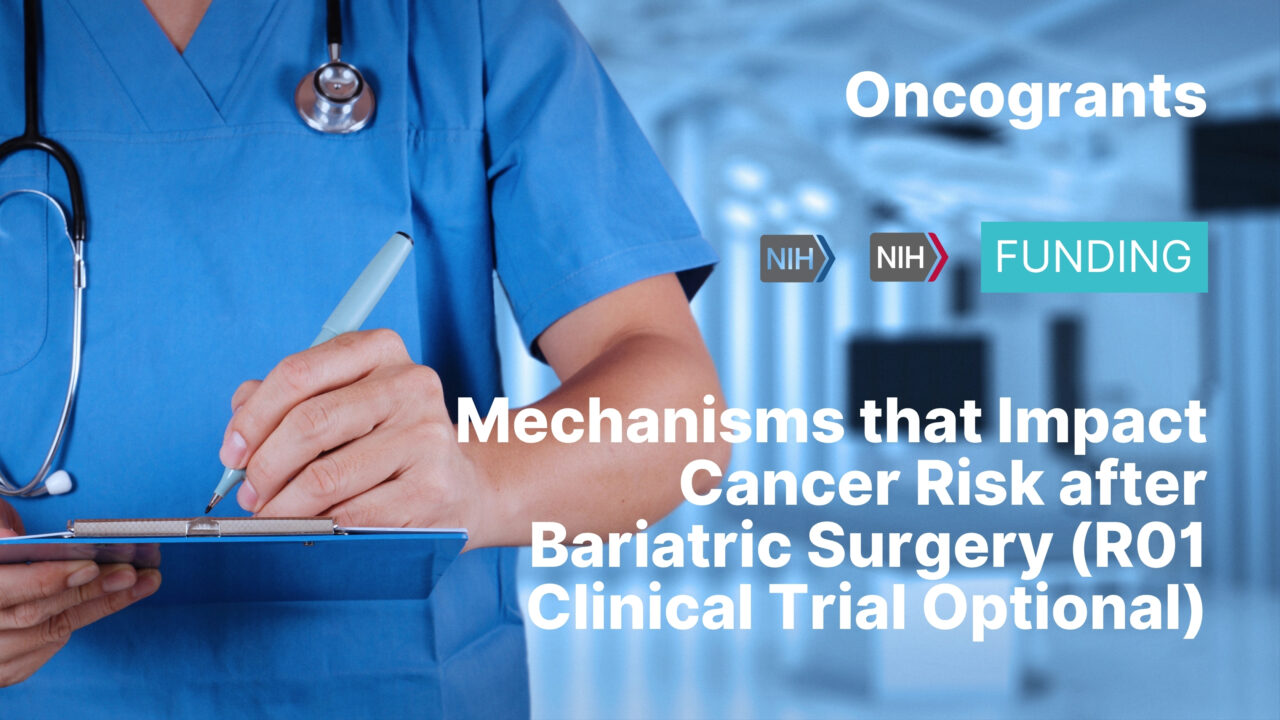The National Cancer Institute (NCI) invites R01 applications to elucidate how bariatric surgery alters cancer risk. Rather than focusing on short‐term metabolic outcomes (e.g., weight loss, diabetes control), this NOFO supports mechanistic studies in animal models and/or humans that link specific surgical procedures to downstream changes—such as bile acids, gut microbiome shifts, or signaling pathway alterations—that influence cancer incidence and progression.
Eligibility Criteria
-
Applicant Organizations:
-
U.S.-based higher education institutions (public or private)
-
Nonprofits (with or without 501(c)(3) status)
-
For-profit entities (including small businesses)
-
Local, state, and tribal governments
-
Federal agencies
-
Independent school districts, public housing authorities, faith-based/community organizations, and regional organizations
-
Not eligible: Foreign organizations and non-domestic (non-U.S.) entities; foreign components of U.S. organizations are allowed.
-
-
Program Director/Principal Investigator (PD/PI):
-
Any individual(s) with the necessary skills, knowledge, and resources to conduct mechanistic research on bariatric surgery and cancer.
-
Applications proposing an NIH-defined clinical trial must include a bariatric surgeon as a key investigator and should be discussed with NCI staff at least 12 weeks before submission to confirm fit.
-
When appropriate, multi‐PD/PI structures are encouraged (e.g., one PD/PI with bariatric surgery expertise and another with cancer biology expertise).
-
-
Application Types Allowed: New, Resubmission, and Revision.
-
Clinical Trial: Optional—applications may include clinical trials, but only if mechanisms (e.g., tissue or fluid endpoints linked to cancer outcomes) are the primary focus.
-
Nonresponsive Applications:
-
Purely epidemiologic studies without mechanistic endpoints
-
Projects focusing exclusively on in vitro experiments
-
Clinical trials lacking a bariatric surgeon on the team
-
Studies that do not evaluate tissue/fluid samples from bariatric surgery recipients with/without cancer
-
Funding Details
-
Mechanism: R01 Research Project Grant
-
Budget: Up to $500,000 direct costs per year
-
Project Period: Up to 5 years
-
Number of Awards: Contingent on available NCI appropriations and number of meritorious applications
Deadlines
-
Letters of Intent (Optional): Due 30 days before each application deadline
-
Application Due Dates (New, Renewal, Resubmission, Revision):
-
February 5, 2025 (5:00 PM local time)
-
June 5, 2025 (5:00 PM)
-
October 5, 2025 (5:00 PM)
-
February 5, 2026 (5:00 PM)
-
June 5, 2026 (5:00 PM)
-
October 5, 2026 (5:00 PM)
-
February 5, 2027 (5:00 PM)
-
June 5, 2027 (5:00 PM)
-
October 5, 2027 (5:00 PM)
-
-
Expiration Date: January 8, 2028
All applications must be submitted via Grants.gov and processed through eRA Commons. No late applications will be accepted.
Where to Go for Further Information
-
Full Announcement: See FOA PAR-25-043 on Grants.gov or the NIH Guide for Grants and Contracts.
-
Companion R21 Opportunity: PAR-25-044 (for exploratory/developmental grants).
-
Scientific/Research Contacts:
-
General & Bariatric Surgery‐Related Questions / Clinical Trials:
Edward R. Sauter, M.D., Ph.D.
Tel: 240-276-7657 Email: edward.sauter@nih.gov
-
Basic Cancer Biology & Mechanism Questions:
Philip Daschner, M.S.
Tel: 240-276-6227 Email: daschnep@mail.nih.gov
-
-
Peer Review Contact:
-
Check your eRA Commons account (assignment appears ~2 weeks after the due date).
-
-
Grants Management Contact:
Amy R. Bartosch
Tel: 240-276-6375 Email: amy.bartosch@nih.gov


